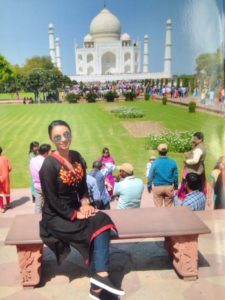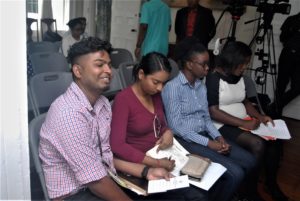 Questions:
Questions:
How long have you been a journalist?
How did your
career unfold?
It is now three months shy of seven years since I joined the media. When I was in secondary school, I had a teacher whom I admired a lot and I saw myself being like her when I got older. At the time, she was studying Communications at the University of Guyana and would tell us about her classes from the day before, so I gradually began taking a liking to the idea of Communications. However, about a year before, what was then CXC exams, my teacher had left the job and I kind of put the whole Communications thing behind my head as I prepare for exams. But then about a year after I finished school, I found out that she was working in the media and again my interest was sparked. So after contacting her and relating my interest, she advised that I apply for a job and I did, at several media entities. At the time though, I was interested in broadcast media, but I ended up sending my applications to mostly print media houses. Luckily, I ended up working for a company, the same my teacher was working for, which has both a television station and a newspaper, so I’ve had the opportunity to do both.
Who were the biggest
inspirations for your career?
Well prior to me joining the media, it was my teacher Venessa Low-A-Chee (oops I forgot to mention her name). Afterwards I’ve meet a lot of persons who pushed me to bounds I didn’t know I had in me and who believed in me, so I was immensely inspired by a few of them – all of whom I had the opportunity to work with. Persons like my former editor, Nigel Williams (now Editor-in-Chief at the Guyana Chronicle); Assistant Editor at the Guyana Times, Bhisham Mohamed; Avenash Ramzan, one of the renowned sport journalists in Guyana; a good friend and former media colleague, Pushpa Balgobin, and most recently, my current Editor at the Guyana Times, Tusika Martin, to name a few, have been my biggest inspirations and supporters.
What has been your
personal key to success?
I’m not sure but I would like to believe that dedication, commitment, stability and an apparent unhindered love for what I do have been the core of what I have achieved thus far, and the driving force to get me where I am today. Because, initially, I was only going to work in the media for about a year or two just to get the experience but I fell in love and I’ve never been able to leave. Although sometimes the urge to do that has been extremely strong, I was never able to find anything else that grab my interest like the media did and still does.
What are some of your
personal and/or
professional goals for the future?
At this point, I don’t see myself doing journalism as a lifetime career but I will continue to do it because I love it and for as long as I could, until maybe something [should] spark whatever it was within me that the media did. But I think I would like to broaden by abilities and go into production because that was where my interest was initially (in broadcast media) before I was swooned by print media.
What are some
common myths about the journalism profession?
Perhaps, that it is a “glamorous job” that allows you to look good in front the camera, meet important/popular/influential people, and gets you into all the events free. I always tell new/young reporters when they join that while those are some of the perks you enjoy on the job, it’s much more. Journalism is a big responsibility and one that should be taken seriously since it shapes the mindset and the thinking of the public.
What have been the
rewards and/or
challenges thus far?
Like with any job, there would always be good days and bad ones, and I’ve experienced some really terrible days but my love for the job allowed me to persevere and continue moving forward instead of giving up and moving on to something else. And luckily, I did because I was able to fulfill one of my dreams – visit India. That has definitely been the highlight of my career. Another reward I get from this job is meeting people from different walks of life, whether its influential people I admire and look up to or just an ordinary man or woman or even a child, and that broadens your perspective a lot.

Do you feel that is
important for someone to be passionate about the journalism profe sion
to be successful?
For sure! I believe the saying: “Do what you love, and it will never feel like a job.” Journalism should not be done by persons who just want a job to pass time or earn money because it takes away a lot from you and you have to make a lot of sacrifices – give up things that are important to you. And the only way you would be able to constantly make those sacrifices is if you love you what you’re doing, and so if you are not committed to journalism as a career, then it you won’t be able to do the job to the best of your ability and it will be reflective in the work you put out. (Guyana Times Sunday Magazine)



